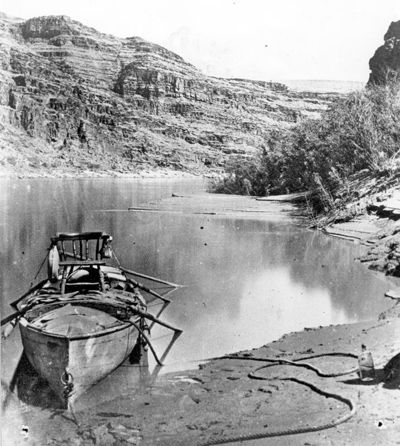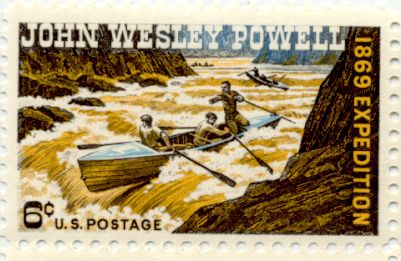John Wesley Powell
In 1869 John Wesley Powell set out to explore the Colorado River with nine men, and cover almost 1,000 river miles through uncharted canyon. They set out May 24th from Green River, Wyoming with four boats constructed of oak, and food for ten months on an exploratory expedition of the American West.
As the expedition's route traveled through the Utah canyons of the Colorado River the ten men endured hardships and dangers. Passing the Confluence of the Green with the Colorado, the expedition was one boat sunk, extremely low on rations, and searching for driftwood to fashion new oars.
July 23, 1869 – “On starting we come at once to difficult rapids and falls, that in many places are more abrupt than in any of the canyons through which we have passed, and we decide to name this Cataract Canyon.”
July 24, 1869 – “Large rocks have fallen from the walls – great angular blocks, which have rolled down the talus and are strewn along the channel. We make three portages in succession. Among these rocks, in chutes, whirlpools, and great waves, with rushing breakers and foam, the water finds its way. We stop for the night only three fourths of a mile below the last camp. A very hard day’s work has been done.”
July 27, 1869 – “Late in the afternoon we discover a flock of mountain sheep a hundred feet above us. We land quickly, out of sight, and away go the hunters. Soon we hear firing. We lash our prizes to the deck and go for a short distance; but fresh meat is too tempting, and we stop to have a feast. And what a feast it is! Two young fine sheep! We care not for bread or beans or dried apple tonight; coffee and mutton are all we ask.”
Six men completed the journey on August 13, 1869. One explorer left the expedition in Vernal where he raised a family. Three were never heard from again after hiking out at Separation Canyon near the bottom of the Grand Canyon.
"What falls there are, we know not; what rocks beset the channel, we know not; what walls rise over the river, we know not."
John Wesley Powell did not see himself as just an explorer. He was a scientist, with a thirst for knowledge. Powell's expedition of the Colorado River led to some of the fundamental principles of geology today. His exploits were the first to convey the depths of our canyons.


